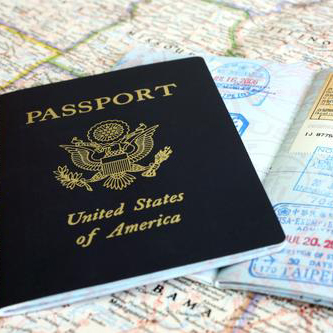How to recognize the symptoms of these serious travel diseases.
Traveling the world is a dream for many. International travel offers educational and cultural benefits that are nearly impossible to gain by staying at home. However, traveling abroad also exposes people to illnesses that are rare or nonexistent in the U.S.
Many of these travel illnesses have vaccines that travelers should get before leaving the country. It’s also smart to know what causes these serious diseases and to recognize symptoms if you or your family experience them. If you have these symptoms, you should seek medical care.
Travel diseases to learn about before traveling
Here are some potentially severe travel diseases you might be exposed to, depending on where you are traveling:
COVID-19
The best way to protect yourself and others from COVID-19 infection is to get up to date with the recommended COVID-19 vaccines before you travel. COVID-19 vaccines are effective at preventing severe illness, hospitalization and death, especially for those who receive booster shots. Different countries and transportation operators (airlines, cruise lines, etc.) may have different requirements for wearing masks, providing proof of vaccination and/or getting tested for infection before you arrive. If you have a weakened immune system you should talk to your health-care provider about the risk of travel and consider delaying visits to areas with high transmission rates of COVID-19.
Influenza (flu)
The best way to protect yourself from flu viruses is to get an annual flu shot. During your travel, wash your hands frequently, boost your immune system before and during your trip by taking a daily vitamin C supplement, use an alcohol-based hand sanitizer before eating, and keep a good distance from people who are coughing and sneezing. Other flu symptoms include fever, body aches, runny nose or congestion, and/or fatigue.
Traveler’s diarrhea
This is a common traveling disease, marked by four or more loose bowel movements in 24 hours. A bacterial infection typically causes it, the result of eating contaminated food or water. Other symptoms may include abdominal cramps, bloating, nausea and vomiting. There are ways to cope with minor symptoms.
Hepatitis B
This is a virus transmitted through blood and blood products. You risk acquiring hepatitis B through tattooing, piercing, sexual contact, blood transfusions, wound contamination, dental procedures and surgical procedures. The Hepatitis B vaccine can protect you from this disease. Symptoms: fatigue, loss of appetite, nausea and vomiting, abdominal pain and/or a change in the color of urine or stool.
Meningitis
There are two types of meningitis: viral and bacterial. Viral meningitis typically spreads through person-to-person contact. It is a serious virus, but people with healthy immune systems typically recover in a week or two. Bacterial meningitis spreads via respiratory secretions (for example, coughing, sneezing, sharing utensils, etc.) This can be a fatal disease. You should see a doctor immediately if you feel any of these symptoms: high fever, stiff neck, nausea and vomiting, sensitivity to bright light, fatigue, confusion and/or seizures.
Rabies
This disease transmits through animal saliva, a bite, scratch or even a lick. Rabies is treatable if the patient gets prompt treatment, ideally within 72 hours. Dogs and bats are the largest groups of carriers. Most countries do not mandate animal vaccine programs, so domestic animals may not have a vaccination. All animal bites should be taken seriously. Scrub the area with soap and water right away and seek treatment within 72 hours if the animal is suspected of having rabies.
Tetanus
The organism causing tetanus, a sometimes fatal disease of the central nervous system, lives worldwide in dust and soil. It can infect a wound or damaged tissue. Vaccination against tetanus is routine in the U.S. All travelers should have an updated tetanus booster every 10 years.
Tuberculosis
This bacterial respiratory infection spreads through the air, usually when an infected person coughs continuously in a closed environment. It’s recommended that you get a tuberculosis skin test six months after returning from your trip. Symptoms: A cough, especially one producing thick, cloudy, sometimes bloody mucus lasting more than two weeks; shortness of breath; fatigue; weight loss; fever; rapid heartbeat; and swollen lymph nodes.
Illnesses transmitted by mosquitoes
Mosquitoes transmit many potentially serious diseases while traveling. Use insect repellent and take other steps to prevent contracting these mosquito-related illnesses:
Malaria
This serious and sometimes fatal disease transmits through mosquito bites. There are no vaccines available for malaria, but medications can help prevent infection. Take this medicine as prescribed. Symptoms: chills, high fever, sweating, headache and fatigue.
Symptoms may not appear for seven to 14 days after infection, and in some cases they can re-occur up to one year later.
Besides medication, other ways to prevent malaria include wearing insect repellent, staying in well-screened areas during evening and night hours, sleeping under mosquito netting, wearing light-colored clothes that cover arms and legs, and avoiding perfume, cologne and scented after-shave lotion.
Dengue fever
Also known as breakbone fever, dengue fever is a mosquito-borne illness found in the tropics, including in urban settings. The mosquitoes bearing this virus breed all year. Dengue virus cannot transmit from person to person.
Symptoms: sudden high fever, increased skin sensitivity, rash, headache, fatigue, joint and muscle aches, nausea and vomiting, and swollen lymph nodes.
Yellow fever
This is another mosquito-borne illness found in some parts of Central America, South America and Africa. It is named for the jaundice (yellowed skin) it produces. Yellow fever is fatal in more than half the unvaccinated people who contract it, so some countries require this vaccine for travel.
Early symptoms: fever and chills, severe headache, back pain, muscle aches, nausea, fatigue and/or weakness. With yellow fever, initial symptoms seem to disappear for a short time. Then the second phase of this travel disease brings more severe symptoms: high fever, severe headache, back pain, nausea and vomiting that can be black in color, abdominal pain, fatigue, bleeding from the nose and gums, confusion and/or seizures.
Japanese encephalitis
Transmission occurs in Asia in rural agricultural settings. It’s rare for travelers to contract this illness when they remain in urban areas, and the risk is also very low for short-term rural travelers. There is a vaccine available for travelers who may be at risk.
Symptoms: In mild infections, a fever with headache. More severe infections produce symptoms such as sudden headache, high fever, neck stiffness, confusion or lack of coordination, coma and tremors or occasional convulsions, especially in infants.

Leaving the country?
The Vanderbilt International Travel Clinic can help you and your family prepare for international travel. Call 615-936-1174 for an appointment well in advance of your trip.

